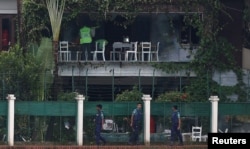Prime Minister Sheikh Hasina has ordered schools and universities to create and publish a list of absent students after Bangladesh’s worst terror strike was mounted by those educated in the country’s elite schools and colleges.
She has also made an unusual appeal to parents and guardians to report missing youth and promised help in tracking them.
Fears of the radicalization of young people through television and internet have also prompted authorities to clampdown on social media sites spreading hardline views and order a ban on an Islamic TV channel run by a controversial Indian scholar.
These steps come as Dhaka confronts a daunting new challenge — young people raised in affluent families with a liberal background taking to terrorism and establishing ideological affiliations with international terror groups. This has shattered the long-held belief that Islamic terror groups are drawing all their recruits from seminaries and madrasas.
Bangladesh blames its growing terror threat on home-grown militant groups.
Other connections
However, Gowher Rizvi, the prime minister’s international affairs adviser, told VOA that although it is clear those involved in the recent attacks had links with the local fundamentalist group, Jamaat-ul-Mujahideen, authorities are also looking for other connections.
“Where we stopped short is failing to recognize that usual technologies, internet connections and what not, they may have forged linkages with other international groups, not only IS, but things al-Qaida, Daesh [Islamic State] and various other organizations. Those we are more focused on as well,” said Rizvi.
Dhaka has stepped up its hunt for those who have gone missing from upper and middle class homes in the aftermath of the July 1 assault on an upmarket café in Dhaka in which the attackers, all under age 22, brutally killed 20 hostages. Belonging to privileged homes, they could easily have been among the customers sipping coffee or ordering a pizza at the same restaurant.
Days later the faces of three young Bangladeshis that flashed on an Islamic State video threatening more strikes in the country were also identified as those from a similar background. Officials say one was a dentist in Dhaka, another an aspiring singer and a third, whose face is partially covered, is probably a management student.
Tracking the missing
All these young people had been reported missing for months.
“Unfortunately there was no systematic reporting of those who had left their homes or disappeared from their academic institutions. We hope to create a data base, we hope to see what connections these missing persons have,” says Rizvi.
The terror strike on the café and on an Eid gathering last week followed the killings of atheist writers, foreigners and religious minorities with increasing frequency in the past two years.
YouTube has been ordered to remove videos of radical preachers. Authorities say they will also ban Peace TV, a popular Islamic channel broadcast from Dubai and run by a controversial Indian scholar, Zakir Naik, who is believed to have influenced some of the attackers involved in the attack on the café.
Some of the devastated parents of the attackers have told local media that they never checked what their children were browsing online and they must have been brainwashed.
“We are looking whether they have been trained at home, or they were trained abroad. We don’t know the answers, but we hope to get these answers very soon,” Rizvi told VOA. “As you know it is complex, it is hydra-headed, it has too many tentacles. Wrapping them all together may take time.”
Unexpected threat
It is not just authorities that are stepping up the hunt for those getting radicalized. Stunned middle and upper class families living in posh neighborhoods are also apprehensive as the young attackers involved in the café strike were once the friends and acquaintances of many in Dhaka.
Abdur Rashid of Dhaka’s Institute for Conflict, Law and Development Studies said the trust that those brought up in liberal homes will never become terrorists has been rudely broken. “It is very unbelievable. Now the filtration net needs to be reoriented. We have to have a new strategy to fight the new threat.”
As the terror attacks in Bangladesh spark growing concern, authorities say they hope to create citizen’s anti-terrorism groups throughout the country where young people will be mobilized to ensure that some of them do not come under the influence of radicals.
Security analyst Rashid says social pressure has been created. "In the elite family whose son is missing now, they are trying to find out by themselves."
Neighboring India is not immune from similar worries. In the southern state of Kerala, questions are being raised in local media whether about 15 missing people, including some recent converts to Islam, may have joined the Islamic State.





